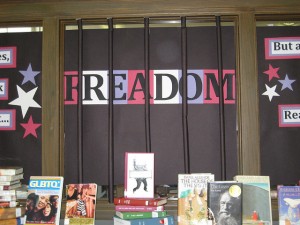 I before E except after C or when sounded as A in neighbor and weigh . . . except when it’s not”
I before E except after C or when sounded as A in neighbor and weigh . . . except when it’s not”
I often give thanks because I am a native English speaker. Choosing the apt word is often difficult. Spelling it is even more challenging some days!
Here are a few reasons you might be glad if you’re a native speaker. Enjoy!
photo courtesy of Natalie Sapkarov
7 responses to “Got English?”
Funny video. I especially like the guy’s delivery. However, I couldn’t disagree more with the underlying assumptions he makes: that there is a “correct” form of English, or that the “rules” he learned in his high school career are prescriptive instead of descriptive. And he has clearly never studied British English, or he would know that the way he pronounced EVERYTHING is totally incorrect (in their eyes). He might want to take a few History of the English Language courses before he makes his next video. Language “correctness” is totally about regional use, as language is the evolving tool of users, not the construction of folks who write grammar and style books. Pick up a grammar book from 100 years ago to see how “incorrect” we all are. In the end, he just comes across as elitist (for making fun of the language usage of the younger generation, some of which will be folded up into the natural evolution of language and become “correct”) and uninformed. Really, the only thing that makes usage “incorrect” is if you can’t get anyone else to catch onto your new usage. This guy above is probably just upset that he’s out of the loop, as the new generation adds things to the evolution of the language that he’s not hip to.
That said, there is a general center (with fuzzy edges that have no clear, cut-and-dry delineation) of agreed upon usage within regions that is considered “proper” by folks like this putz above. Those folks, who mistake description for prescription, are usually the literalists in charge of hiring other folks for jobs, so they do their darnedest to weed out those folks who seem “ignorant” due to language usage tied to groups who are looked down upon in our society (usually the poor and non-White–although Southern English gets the same treatment due to an extreme bias by Northerners against Southerners). So, I do teach my students to use the written English accepted by the American business world and to save their regional variations (those things that make language live and evolve!) for conversational English. Eventually, a few or many of their language inventions will make it into accepted usage, and then they can be the discriminating bosses, who look down upon the older generation of English speakers with their quaint, old fashioned ways of saying things.
Amen, Sister!! Especially grating when heard from a pulpit!! I don’t think anyone has heard of adding LY to an adverb any more…..what IS an adverb, anyway? Everyday conversations are one thing, but speaking improperly in formal settings is annoying!!
LOVE THIS!!! I will always say that Greek is a MUCH easier language than English. At least with Greek, what you see is what you say. There are no hidden rules. And yet, I am a proud editor of the English language. Perhaps I am just as complicated!
Thanks for crediting the photo. Though I do want to say that I can spell correctly – I just chose not to since we were celebrating Banned Books Week, and the word “read” finds itself nicely in “freedom,” if you let it. 🙂 You wouldn’t believe how many times students came up to me to tell me that I was completely incompetent and didn’t know how to spell, haha. I was proud of the few that noticed my hidden message!
Hey, Natalie!
You’re welcome! I know you can spell correctly. I read your reasoning for the spelling before I used the photo. I just thought it illustrated the point of English’s discrepancies in spelling and pronunciation. Thanks for being a good sport! In what feels like a former life, I was a high school English and social studies teacher . . . I have no problem believing you had many comments on your “misspelling.” Keep up the good work!!
Oh, Judy! Bad grammar from the pulpit (or any other particularly public forum) is cringe-worthy. I think adverbs are the most overlooked parts of grammar.
Thanks for a good reminder that language is a living thing, Robert. I was more interested in the way he portrays the difficulty of English at the beginning of the video. We speak at least one confusing language. I think one of the beautiful things about English is the way it’s so mutable. The French system with the Academy setting forth strict rules delineating what are true words and true grammar constructions would never work in this country. While French has many regional variations in pronunciation, the rules of grammar are solid.
When I hear the “Wannagettapizza?” type talk in a more formal setting, I generally assume the speaker is verbally lazy. It’s a definitel bias on my part. “Wannagettapizza?” doesn’t cause me any consternation when it’s said in casual conversation. Context is key–at least for me.
Thanks for adding some perspective!